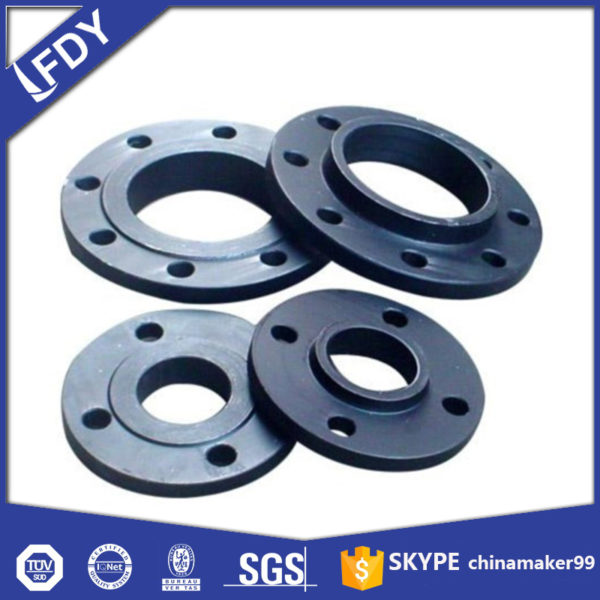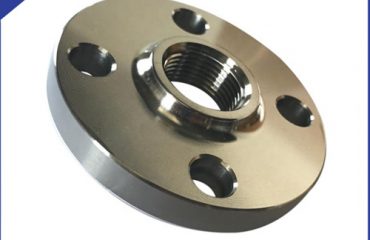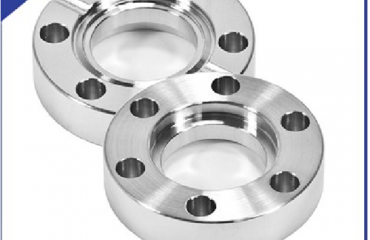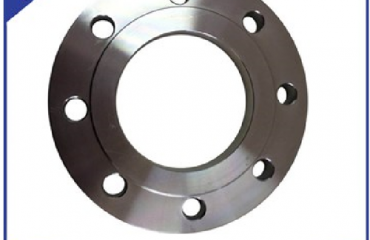
In the intricate network of industrial piping systems, carbon steel flanges emerge as indispensable components. These flanges play a pivotal role in connecting pipes, valves, pumps, and other equipment, ensuring a seamless and secure flow of fluids and gases. This article delves into the multifaceted world of carbon steel flanges, exploring their composition, types, applications, and advantages.
Composition and Properties of Carbon Steel Flanges
Carbon steel flanges are crafted from carbon steel, an alloy predominantly composed of iron and carbon. The carbon content in carbon steel typically ranges from 0.1% to 2.1% by weight, and this carbon significantly shapes the steel’s characteristics. As the carbon percentage increases, the steel becomes harder and stronger. However, this gain in strength is often accompanied by a reduction in ductility and weldability.
Carbon steel flanges offer a host of beneficial properties. Their high tensile strength enables them to endure substantial pressure and mechanical stress, making them suitable for high – pressure piping systems prevalent in industries like oil and gas, power generation, and chemicals. Additionally, carbon steel flanges exhibit good toughness, allowing them to withstand impact and sudden loads without fracturing.
Another advantage lies in their relatively decent corrosion resistance. While not as corrosion – resistant as stainless steel, carbon steel flanges can withstand the normal corrosive environments found in many industrial settings. In some cases, additional protection against corrosion can be provided through methods such as painting, galvanizing, or applying corrosion – resistant coatings.
Types of Carbon Steel Flanges
There is a diverse array of carbon steel flanges, each tailored to specific installation and operational needs:
Weld Neck Flanges: These flanges feature a long, tapered neck that is welded to the pipe. The tapered design evenly distributes stress, rendering weld neck flanges suitable for high – pressure and high – temperature applications. They offer a robust and leak – proof connection, often used in critical piping systems.
Slip – On Flanges: Slip – on flanges are designed to slide over the pipe end and are then welded in place. They are relatively straightforward to install and are commonly used in low – to medium – pressure applications. Slip – on flanges are a cost – effective option, suitable for situations where the mechanical stress is not extremely high.
Blind Flanges: Blind flanges are used to close the end of a pipe or vessel. Lacking a central hole, they are typically employed for maintenance, inspection, or to isolate a section of the piping system. Blind flanges can be bolted onto the flange connection, creating a secure and sealed end.
Threaded Flanges: Threaded flanges have internal or external threads that allow them to be screwed onto the pipe. They are frequently used in applications where welding is not feasible or practical, such as in small – diameter pipes or areas with fire hazards. Threaded flanges provide a quick and convenient pipe – connecting method, though they may not be as suitable for high – pressure applications as welded flanges.
Socket Weld Flanges: Socket weld flanges have a socket into which the pipe is inserted and then welded. They are commonly used when a compact and leak – proof connection is required. Socket weld flanges are suitable for small – diameter pipes and are often found in the instrumentation and control systems within industrial plants.

Applications of Carbon Steel Flanges
Carbon steel flanges find extensive use across a wide spectrum of industries due to their versatility and reliability:
Oil and Gas Industry: In the oil and gas sector, carbon steel flanges are employed in pipelines for transporting crude oil, natural gas, and refined products. They are also used in refineries, petrochemical plants, and offshore platforms to connect various equipment and piping systems. Their ability to resist high pressures and temperatures makes them ideal for these harsh operating conditions.
Power Generation: Carbon steel flanges are essential components in power plants, whether coal – fired, gas – fired, nuclear, or renewable energy plants. They are used to connect pipes carrying steam, water, and other working fluids, as well as to attach turbines, generators, and other power – generating equipment. Their durability and strength ensure the safe and efficient operation of power generation systems.
Chemical Industry: The chemical industry demands piping systems that can handle a variety of corrosive and hazardous chemicals. Carbon steel flanges, when appropriately coated or lined, can be used to transport chemicals like acids, alkalis, and solvents. They are used in chemical reactors, storage tanks, and transfer pipelines, providing a reliable connection that can endure the chemical environment.
Water and Wastewater Treatment: In water treatment plants and wastewater treatment facilities, carbon steel flanges are used to connect pipes for the distribution of clean water and the collection and treatment of wastewater. They are designed to withstand the pressures and corrosive substances present in these systems, ensuring the proper functioning of the treatment processes.
Mechanical Engineering: In mechanical engineering applications, carbon steel flanges are used to connect components such as shafts, couplings, and gears. They provide a secure and stable connection, enabling the efficient transmission of power and motion. Carbon steel flanges are also used in the construction of machinery and equipment, where their strength and durability are crucial.
Advantages of Carbon Steel Flanges
Cost – Effectiveness: Carbon steel is a relatively affordable material compared to some other alloys, such as stainless steel or nickel – based alloys. This cost – efficiency makes carbon steel flanges an attractive option for many industrial applications, especially those with large – scale piping systems. The lower cost of carbon steel flanges can help reduce the overall project cost without sacrificing performance.
High Strength and Durability: As mentioned earlier, carbon steel flanges possess high tensile strength and toughness, allowing them to bear heavy loads, high pressures, and harsh operating conditions. Their durability ensures a long service life, minimizing the need for frequent replacements and maintenance, thus saving both time and money in the long term.
Ease of Fabrication and Installation: Carbon steel is easy to work with, and carbon steel flanges can be fabricated using methods like forging, casting, and machining. The fabrication process can be customized to meet specific design requirements. Moreover, carbon steel flanges are relatively easy to install, whether through welding, bolting, or threading, depending on the flange type. This ease of installation reduces installation time and labor costs.
Versatility: With a wide variety of types, sizes, and pressure ratings available, carbon steel flanges can be customized to fit almost any piping application. They can be used with different pipe materials and in various industries, making them a highly adaptable choice for connecting and joining piping systems.
Good Weldability: Carbon steel has good weldability, meaning it can be easily welded to other carbon steel components or, in some cases, to different materials. This property enables the creation of strong and reliable connections in piping systems, further enhancing the overall system’s performance and integrity.
 Language
Language Espanol
Espanol English
English Italian
Italian عربى
عربى
 Skype: chinamaker99
Skype: chinamaker99  Tel: 86-316-5120812
Tel: 86-316-5120812  Email:
Email:  Whatsapp:
Whatsapp: 

